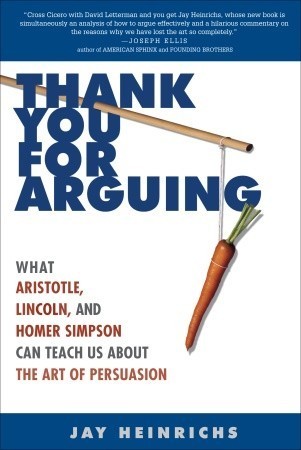Thank You for Arguing Book Summary
What Aristotle, Lincoln, and Homer Simpson Can Teach Us About the Art of Persuasion
TL;DR
Thank You for Arguing by Jay Heinrichs serves as a master class in the art of persuasion, blending classical rhetorical techniques with contemporary methods to enhance communication skills and improve argumentation.

Get full Book
What is Thank You for Arguing about
In Thank You for Arguing, Jay Heinrichs dives into the world of rhetoric, revealing how understanding the art of persuasion can enhance personal and professional communication. The book is structured into five parts—Introduction, Offense, Defense, Advanced Offense, and Advanced Agreement—guiding readers through the essential techniques of effective arguing. Heinrichs uses a blend of historical examples, contemporary references, and popular culture to illustrate his points, making the content relatable and engaging. By examining figures from Aristotle to Abraham Lincoln and even Bart Simpson, Heinrichs underscores the timelessness of persuasive strategies and their application in everyday scenarios, from casual debates to formal speeches.
Thank You for Arguing 8 Key Takeaways
The Basics of Rhetoric
Heinrichs introduces the foundational elements of rhetoric, emphasizing its importance in understanding and influencing an audience's thoughts and actions.
Cicero's Three-Step Strategy
Utilizing Cicero's framework, Heinrichs teaches readers to prepare their arguments by establishing ethos (credibility), pathos (emotional appeal), and logos (logical reasoning).
The Identity Strategy
The author explains how aligning a speaker's identity with the audience's can create a bond that encourages agreement, making the audience more receptive to persuasion.
The Role of Humor
Heinrichs highlights the effectiveness of humor in persuasion, showing how it can lower defenses and create a connection between the speaker and the audience.
Contemporary Techniques
The book covers modern persuasive techniques, including the use of coded language in politics, demonstrating how language evolves but remains a powerful tool for persuasion.
Argument as a Tool for Improvement
Heinrichs argues that mastering the art of argumentation can lead to personal growth and better decision-making, helping individuals navigate complexities in life.
Practical Applications
Readers are given practical strategies to apply rhetorical techniques in daily life, from casual discussions to professional settings, enhancing their persuasive abilities.
Cultural References
The inclusion of figures like Homer Simpson and cultural references makes the concepts accessible, showing that persuasion is relevant across all walks of life.
Top Thank You for Arguing Quotes
- "The art of persuasion is the art of getting someone to see your point of view without them realizing it."
- "Rhetoric is not just a tool for public speaking; it’s a skill for everyday life."
- "Argument is the means by which we can influence others, foster understanding, and seek solutions."
Who should read Thank You for Arguing?
This book targets anyone interested in improving their communication skills, from students to professionals, political enthusiasts, and casual debaters. Readers will find valuable insights into the mechanics of persuasion, helping them to argue more effectively and confidently in any situation.
Thank You for Arguing Best Reviews
- "Heinrichs' humorous and insightful writing makes the arcane art of rhetoric both enjoyable and accessible to the modern reader." - The New York Times Book Review
- "A refreshing take on argumentation that balances classic theory with contemporary examples; a must-read for anyone looking to enhance their persuasive skills." - Publishers Weekly
- "A witty and engaging guide that redefines how we think about arguing, making it an essential read for students and professionals alike." - Library Journal
People also liked these summaries
Thank You for Arguing FAQs
What can I learn from Thank You for Arguing?
Readers can learn key techniques of persuasion, including how to structure arguments effectively, engage audiences, and utilize humor and emotional appeal in their communication.
Is this book suitable for beginners in rhetoric?
Yes, Thank You for Arguing is designed for both novices and those familiar with rhetoric. It breaks down complex concepts into relatable lessons and practical applications.
How does Heinrichs use popular culture in the book?
Heinrichs incorporates references from popular culture, such as Bart Simpson and Yoda, to make rhetorical strategies more relatable and to demonstrate their relevance in modern discourse.
